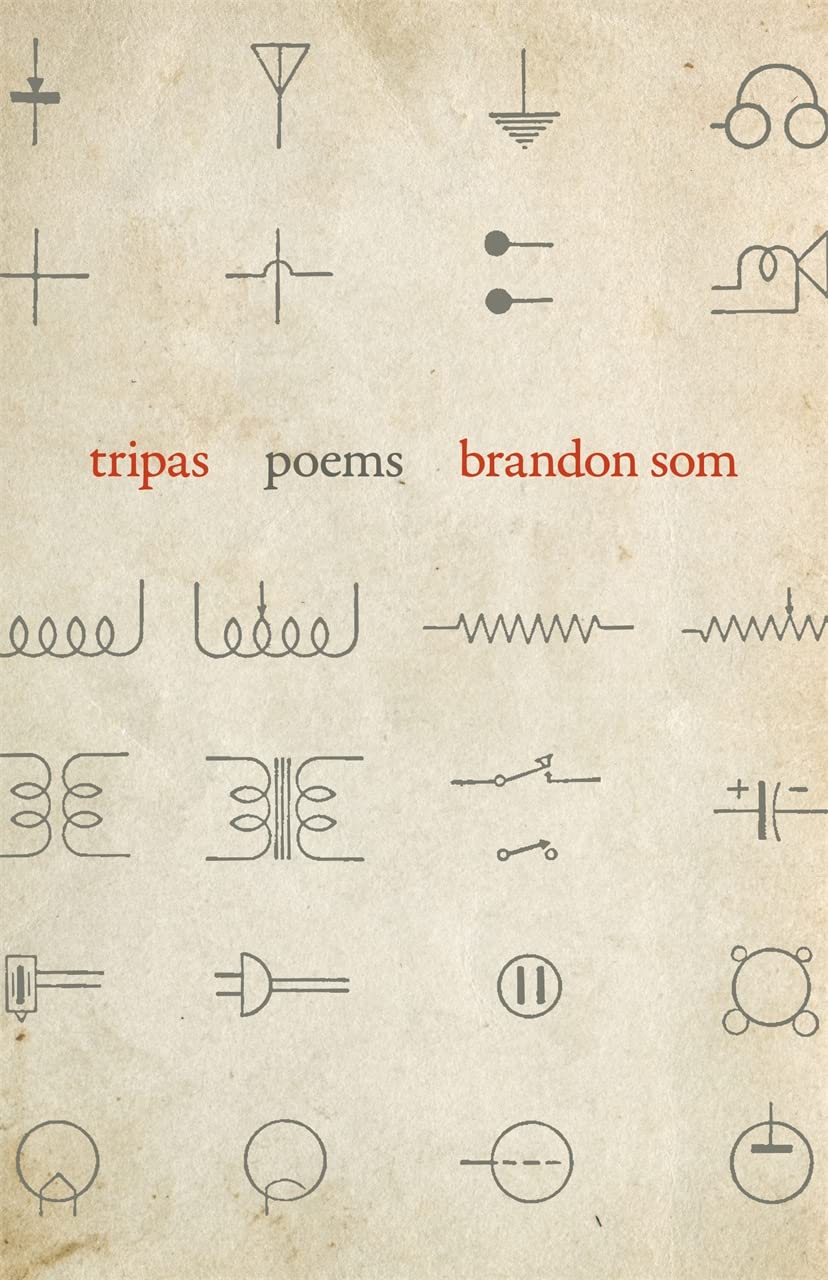By BRANDON SOM
This piece is excerpted from Brandon Som’s Tripas, which won the 2024 Pulitzer Prize for Poetry. Som will be a guest at Amherst College’s LitFest 2025, an exciting, 10th-anniversary celebration of Amherst’s literary legacy and life. Register here.

ANTENNA
Tuning not lute but car radio, Cocteau’s Orpheus copies the
broadcasts from a netherworld for verses—
his muse a circuitry my grandmother inspected
nights at Motorola. Before her shift, she put me to bed, laid down
beside me & smoked Parliaments—
each drag like tower light to planes overhead.
From crest to crest is wavelength & frequency
the number per second. Where the waves won’t reach,
we call shadow, count the radio’s components
like prosody—diodes, triodes, tetrodes—& dial
the frequency in meters. Jack Spicer cited quasars,
quasi-stellar radio traveling lightyears, as possible sources.
I remember Orion—one slick matador, Tió called him —up on
South Mountain, leaning on towers,
red-eyed with warning & somehow—by frequency,
by transmissions I vaguely knew—drunk with music. With ham
operator, Pauline Oliveros sent a hello
to the moon’s tympanum. It bounced back, dropped
in pitch by Doppler effect & she accompanied
the sound on accordion. A nana is lullaby, cradlesong,
I tell my mom, a nana now & we talk about how
neither of us had heard that before: cancíon de cuna— the lacuna
we hum (& tune by)—its tonic note
a chord knot we worry (& teethe on) with night song.
One grandmother with Vicks, one with Tiger Balm, rubbed
fires of camphor & mint, old poultices,
into my chest: their palms kneading & wet with salve,
its menthols, to strip the chaff & rattle in a night wheeze. Can you
hear their lullabies? One like the dicho,
chiquito pero picoso, one in all five tones of village dialect—
with wish-hum for thresholds, they put to bed each name for the
night. In Cocteau’s version, Orpheus crosses
over through a tailor’s mirror. The carnival house optics
of Marx’s commodity fetish, I thought, or my father
in Phoenix, stocking the reach-in with Old Milwaukee
& seeing in the glass, a brief moment, his own reflection.
Ai Gu tells me great-grandfather frequented Chinatown fortune-
tellers, ones with charts & calendars—a crystal-ball
almanac for a paper son on a paper path, a celestial
divination in the back room of butcher or herbal shop, or corner
store like our own, where till bell drifted back
to find Ng Ng—her wok kicking spark off stove flame—
or find me at a desk my father fashioned from Schlitz twelve-packs
for weekend’s homework: me copying out
my name—a dotted line running through its center—
& not knowing the silences, not knowing then the cost of turning
back to see. In today’s news, U.S. troops install
the miles of border razor wire, so-called concertina
for the coil that extends & flattens like the bellows
of a squeeze-box. “Listen to everything all the time & remind
yourself when you are not listening,” instructed Oliveros,
a composer of sonospherics & a chi kung student
of quantum physics. “In practicing,” she once explained
“I have experienced listening with the palms of my hand.”
Brandon Som is a Chicano and Chinese American poet. His most recent poetry collection, Tripas, was awarded the 2024 Pulitzer Prize in Poetry and was a finalist for the National Book Award. He is also the author of The Tribute Horse, which won the 2015 Kate Tufts Discovery Award. He lives in San Diego, on the traditional and unceded territory of the Kumeyaay Nation, and teaches literature and creative writing at the University of California, San Diego.




